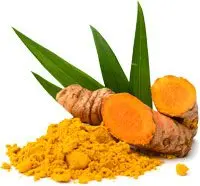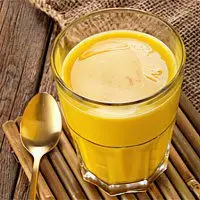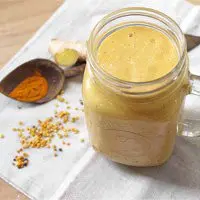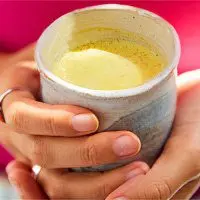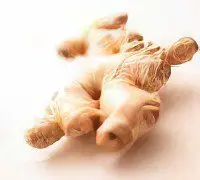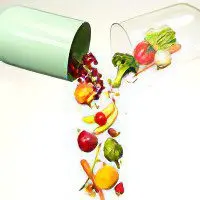235 compounds have been found in turmeric, primarily phenolic compounds and terpenoids. 22 diarylheptanoids and diarylpentanoids, 8 phenylpropenes and other phenolic compounds, 68 monoterpenes, 109 sesquiterpenes, 5 diterpenes, 3 triterpenoids, 4 sterols, 2 alkaloids and 14 other compounds have been identified.
The main non-volatile compounds are curcuminoids (1-6% of the total root volume). In turn, curcuminoids are represented by curcumin (75-81%), demethoxycurcumin (15-19%) and bisdemethoxycurcumin (2,5-6,5%).
The main volatile compounds are AP-turmerone, α-turmerone, β-turmerone (Kerlon), AP-curcumene, zingiberene, α-phellandrene, 1,8-cineol, and some other sesquiterpenes.
*Turmerones are sesquiterpenoid cyclic ketones that make up 40-50% of the volatile oil.
In addition, the root contains 0,76% alkaloids, 0,45% saponins, 1,08% tannin, 0,03% sterol, 0,82% phytic acid, 0,40% flavonoids, and 0,08% phenol.
Calories 312 KKal
- Fats:
3,2 g
- Proteins:
9,7 g
- Carbohydrates:
44,5 g
- Water:
12,8 g
- Ash:
7 g
- Cellulose:
22,7 g
Vitamins and vitamin-like | in 100 |
Vitamin C, Ascorbic acid | 0,7 mg |
Vitamin B1, Thiamin | 0,06 mg |
Vitamin B2, Riboflavin | 0,15 mg |
Vitamin B3, PP, Niacin | 1,35 mg |
Vitamin B4, Choline | 49,2 mg |
Vitamin B5 Pantothenic Acid | 0,54 mg |
Vitamin B6, Pyridoxine | 0,11 mg |
Vitamin B9, Folic acid | 20 mcg |
Betaine | 9,7 mg |
Vitamin B12, Cobalamin | 0 mcg |
Vitamin A, Retinol | 0 mcg |
Vitamin D (D2 + D3) | 0 mcg |
Vitamin K, phylloquinone | 13,4 mcg |
Vitamin H, biotin | 0 mcg |
Vitamin E: | |
Beta tocopherol | 0,01 mg |
Alpha tocopherol | 4,43 mg |
Gamma tocopherol | 0,72 mg |
Amino acids: | in 100 |
Essential amino acids: | |
arginine | 0,54 g |
valine | 0,66 g |
Gistidin | 0,15 g |
Isoleucine | 0,47 g |
leucine | 0,81 g |
lysine | 0,38 g |
methionine | 0,14 g |
threonine | 0,33 g |
tryptophan | 0,17 g |
phenylalanine | 0,53 g |
Non-essential amino acids: | |
alanine | 0,33 g |
Aspartic acid | 1,86 g |
glycine | 0,47 g |
Glutamic acid | 1,14 g |
Proline | 0,48 g |
serine | 0,28 g |
Cysteine | 0,15 g |
tyrosine | 0,32 g |
Fatty acid: | in 100 |
Saturated: | 1,838 g |
Kaprilovaя | 0,003 g |
capric | 0,848 g |
Lauric | 0,003 g |
myristic | 0,394 g |
Margarinovaya | 0,335 g |
palmitic | 0,155 g |
Stearinovaya | 0,003 g |
arachidic | 0,097 g |
Monounsaturated: | 0,449 g |
Omega-9 (oleic) | 0,131 g |
Myristoleic | 0,154 g |
Heptadecenoic | 0,164 g |
cis fats | 0,075 g |
Trans fats | 0,056 g |
Polyunsaturated: | 0,756 g |
Omega-3 (linolenic) | 0,084 g |
Omega-6 (linoleic) | 0,672 g |
Minerals | in 100 |
Macronutrients: | |
Potassium, K | 2080 mg |
Calcium, Ca | 168 mg |
Magnesium, Mg | 208 mg |
Phosphorus, R | 299 mg |
Sodium, Na | 27 mg |
Sulfur | 96,8 mg |
Trace elements: | |
Iron, Fe | 55 mg |
Manganese, Mn | 19,8 mg |
Copper, Cu | 1300 mcg |
Selenium, Se | 6,2 mcg |
Zinc, Zn | 4,5 mg |
Main substances: | in 100 |
Water | 12,85 g |
Proteins | 9,68 g |
Fats | 3,25 g |
Ash | 7,08 g |
Carbohydrates | 44,44 g |
Fibre | 22,7 g |
Sakharov (total) | 3,21 g |
sucrose | 0,38 g |
Glucose (dextrose) | 0,38 g |
fructose | 0,45 g |
Caffeine | 0 mg |
theobromine | 0 mg |
Back to the description of the medicinal properties of turmeric ➤
